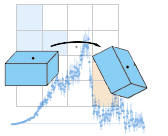
| HOME | PEOPLE | RESEARCH | ACADEMICS | TRAVEL/VISITORS | LINKS | CONTACT |

|
Web Mail
Mailing Lists
Computing Resources
Site Map
Thesis Defense: Wireless Network Design and Control
Lijun Chen
Wednesday, November 1, 200610:00 AM to 12:00 PM
114 Steele (Library)
Abstract: Optimization theory and game theory provide a suite of tools that are flexible in modelling various network systems, and a rich series of equilibrium solution concepts and convergent algorithms to guide systematic design of network protocols. In this talk I will present two wilreless network designs, cross-layer design and contention control, in optimization and game theoretic frameworks, respectively.
We first take a holistic approach to design the layered protocol stack in ad hoc wireless networks. Our goal is to integrate various protocol layers into a unified framework, by regarding them as distributed computation over the network to solve some optimization problem. Our current theory integrates three functions -- congestion control, routing and scheduling -- in transport, network and link layers into a coherent framework. These three functions interact through and are regulated by congestion price so as to achieve a global optimality, even in a time-varying environment. This framework is promising to be extended to provide a mathematical theory for network architecture, and allow us to systematically carry out cross-layer design.
We then develop a game theoretic framework for contention control.
We define a general game theoretic model, called random access game, to study the contention/interaction among wireless nodes, and propose a novel medium access method derived from CSMA/CA according to distributed strategy update mechanism achieving the Nash equilibrium of random access game. This results in simple dynamics, controllable performance objectives, good short-term fairness, low collision and high throughput. In addition to providing a general and systematic design methodology for medium access control, the random access game model also provides an analytical framework to understand equilibrium and dynamic properties of different medium access protocols and their interactions.
|
©2003-2011 California Institute of Technology. All Rights Reserved webmaster |
|